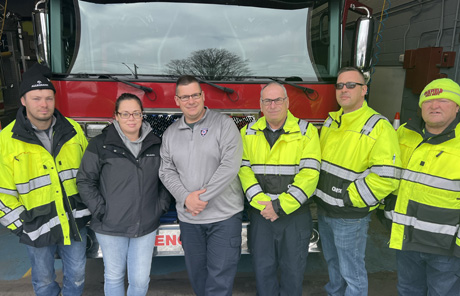
Heading out on one of his search and rescue missions during the blizzard on Friday, Joshua Finn said he had two fears.
That they would find somebody dead in a car.
Or that he wouldn't make it home, himself.
He came close to both tragic outcomes, he thought, around 1 a.m. on Saturday when he and another volunteer firefighter from Oakfield came across a pickup truck stuck on Judge Road. Its flashers were barely flashing, so he knew it had been there a long time. The battery was nearly dead. Inside, they found a 60-year-old man and his 27-year-old daughter.
"They were both hypothermic, and they were completely saturated," Finn said. "The snow was blowing through the cracks in the vehicle."
With great effort, Finn, another EMT and other volunteers got them out of the pickup and into a rescue truck and started the drive back to the Oakfield Fire Hall. It was a scary trip, he said. They weren't sure they would make it back in zero visibility conditions.
"Colin and I couldn't get the interior dome lights to shut off because the door button was frozen," Finn said. "We couldn't see much because there was a light inside the cab. We had to have the windows down to look out the windows to drive. Colin says, 'Finn, go left, Finn, go right,' and we're going at one mile an hour. I got frost nip on my ears from because all I had was my firefighting hood. I was shivering by the time we got back with them."
Miraculously -- County Manager Matt Landers has called it a Christmas miracle -- there are no known fatalities in Genesee County as a result of Winter Storm Elliott, which hit the area with a ferocity unknown since 1977.
A perfect storm
The dangers of the storm were exacerbated by a Thruway Authority that shut down the I-90 with no plan to send travelers on safe routes and with Google and Apple map technology ill-equipped to warn drivers of dangerous weather conditions and send them on routes that would take them around the hazardous roads.
Landers observed during the storm that in a situation that might have otherwise involved a handful of local people getting trapped on snow-covered roads, there were hundreds of cars that got stuck.
More than 700 people, most of them not from New York, wound up in one of 11 warming centers, and it's unclear how many others were taken in by residents who opened their doors when strangers came knocking during the storm.
The task of rescuing motorists fell to quickly assembled teams of deputies, highway crews, and volunteer firefighters.
And with winds over 35 mph and temperatures well below zero, and a forecast of storm conditions persisting for at least 48 hours, search and rescue teams didn't have the luxury of waiting until daylight or until the weather cleared. They had to head out in the dead of night with the resources available.
Gary Patnode is both the deputy emergency management coordinator for Genesee County and the Chief of the Alabama Volunteer Fire Department. He was right in the thick of it when the storm hit.
He praised dispatchers for helping triage stranded motorists.
Those with full gas tanks were told to keep their engines running and wait unless they could see a house nearby they could safely get to. When they had less than a quarter tank of gas or a medical condition, they became a priority to rescue.
Among the medical conditions being reported -- "trouble breathing."
Patnode found that understandable. You're out there not knowing how, when, or if you will be rescued.
"I think that was a direct result of anxiety, you know, from being in an unfamiliar area, it's pitch black out because there are no streetlights out there, and that snow is blowing," Patnode said.
"Every car, every window that we cleaned off, I just held my breath, you know, hoping that I didn't find a body in there," Patnode said. "That was the big thing."
It takes a village
While the brunt of the storm fell on Oakfield and Alabama, and volunteer departments in those communities had a total of more than 30 volunteers participate in search and rescue operations, nearly every department in the county sent either personnel or equipment, and usually both, such as Le Roy, Alexander, and Bethany, to the northwest quadrant to help out, along with Genesee Snopackers.
On the paid side of responders, there were Sheriff's deputies, personnel from Orleans and Livingston counties, State Police, State Parks, the Department of Environmental Conservation, and Batavia city police and fire departments.
In Oakfield and Alabama, community residents also pitched in, either by offering shelter, delivering supplies, moving snow, or cooking meals. The Oakfield Fire Hall became a warming shelter and housed several dozen people during the storm. There were so many travelers emotionally affected by the storm and being stranded that Downing took their phone numbers to follow up with them after they returned to their homes.
"We are still contacting them to find out how they're doing and that they're okay, you know, checking on their mental health," Downing said. "It's traumatizing for a lot of these people to be stranded and then have to be rescued. We want to make sure that they're okay."
During the weekend, stranded travelers also needed to be fed, so the community fed them. One firefighter's wife baked her Christmas ham and brought it in. Wives and girlfriends showed up to make breakfast. Meals and supplies were delivered from Batavia. H.P. Hood donated dairy products.
At one point, Oakfield Fire Chief Sean Downing was worried about being able to feed all these people for a couple of days and soon, he realized the community was taking care of it.
When Downing had to get home to check on his wife, Jeremy Yasses plowed his driveway so he could park. Another community resident made sure the driveways of other volunteers were cleared so they could easily drop in and check on their families.
"People would come up to us and go, 'Oh, if I could just brush my teeth,'" Downing recalled. "then William Sturgeon thought to himself, he says, 'You know what, I have kids. We go to the dentist and they always give us toothpaste and toothbrushes, and dental floss,' so he ran home, which wasn't far from the Fire Hall, and came back with about 20 toothbrushes and the people were ecstatic that they could at least brush their teeth."
It's the little things, Downing said, that make a big difference.
"They say that it takes a village," said Downing. "Well, it's more than the village. It was the entire town and village of Oakfield that was calling and coming together and getting us whatever we needed to be able to take care of these people. They understood what was going on and what we were going through, and they wanted to make sure that any little bit that they could do, they did."
The department had hosted a Christmas party for its members a couple of days before the storm, and there were still wrapped presents for children under the tree, so the kids at the shelter had Christmas presents to open.
Saving lives
The children were kept in the department's second-floor rec room. Downing wanted to shield them from any potential life-saving situations in the main bay of the fire hall.
"I think we had a total of three or four hypothermic patients throughout the event," Downing said. "The one gentleman that Josh was talking about was our first patient, and the medics came up to me at one time and said, 'We do not think, based on what we're seeing on the monitors and whatnot, and what we're talking about, he may not make it. But again, he pulled through. Once he warmed up, everything started to change for him. He was one of our first patients in the building, and he was the last one to leave our building after the event."
To treat hypothermic patients in a field-hospital situation, medics stripped them of all their cold, wet clothes and wrapped them in blankets. A couple of firefighters' wives kept supplying warm blankets from the department's clothes dryer.
Finn doesn't remember where he had seen it done before or where he got the idea from, but he suggested taking hand-warming packets and taping them to IV bags, so the fluid being given to patients was warmed.
While there were "official" warming shelters at fire halls -- such as Indian Falls, besides Oakfield, and schools, such as Elba -- there were several unofficial warming shelters, such as Alabama Hotel. Grace Baptist Church in Batavia also opened as a warming shelter. Patnode listed off five or six homes that took in six, seven, and eight stranded travelers and one resident on Macomber Road had at least 50 people sheltering in his garage.
"It was just remarkable how the community came together," Patnode said. "You know, even for us as an organization, when you're working with a volunteer fire department, there are so many different personalities, and everybody just sets that stuff aside and just works together."
See also: Stranded travelers offered a warm home and holiday hospitality by Oakfield couple
Gratitude
There was no shortage of gratitude among the travelers who were rescued.
Downing noted that many of the department's guests pitched in and helped, cleaning up, shoveling snow, moving supplies as needed.
The boldest gesture of gratitude perhaps came from the first woman Finn rescued.
On Friday, as the storm began to roll in, he decided he couldn't stay at his job in Batavia. He had to get home to his family and his community.
As he drove toward Oakfield, he heard a call for a stuck vehicle with a woman finding it difficult to breathe. He told dispatchers to keep the ambulance in Batavia, where it couldn't get stuck, while he checked it out.
He found a woman from Canada, with her daughter, having a panic attack.
He told her not to worry. He told her to follow him to Oakfield, where there was a warming shelter.
He said the drive on Route 63 was difficult. The whiteout conditions were disorienting, and at one point, he went off the road and became stuck in a ditch himself.
"You didn't know what was up or down," Finn said. "At one point, I was going two miles an hour, and I ended up in a ditch. The only reason why I got out, and it's no joke, I swear to God, I think what saved my life was a deputy named Richard Schildwaster came along with his truck and got me out."
When they got to the hall, the woman from Canada wanted to thank Finn in a big way. She offered him a piece of jewelry.
"She kept saying you saved my life," Finn said. "You guys, you saved my life. She tried to give me this 24-karat gold ring and put it in my hand and would not take it back and I'm like, 'I can't. I can't. This is what we do. I'm not taking your ring.'
"She was, 'you have to.' I'm like, 'It's okay. I didn't do anything. I just had you follow me.' I'm like, 'I can't take this from you.' And she's like, 'You have to.'
"So I dialed my wife. I said, 'talk to my wife' because my wife was not happy that I left Batavia to come to Oakfield, and I didn't tell her what I was doing until I got to the village, and I said, 'I'm in Oakfield. Don't be mad.' So I was like, 'Here, talk to my wife.'
"I don't even know what conversation they had, but it settled down my wife."
Submitted photos. Top photo: Justin Cooper, Tera Williams, Joshua Finn, Chief Sean Downing, Assistant Chief Chad Williams, Buck Hilchey
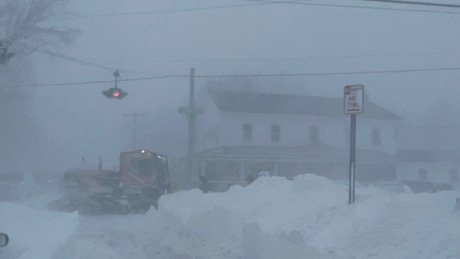
Near whiteout conditions outside Alabama Hotel.
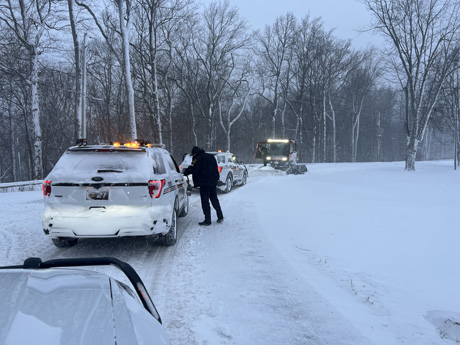
Sheriff's patrols and the Snopacker's groomer clearing roads and checking vehicles along the roadway. Oakfield Chief Sean Downing noted that one convoy that started out on South Pearl in Oakfield during the height of the blizzard Saturday morning took five hours to reach the Indian Falls Fire Hall.
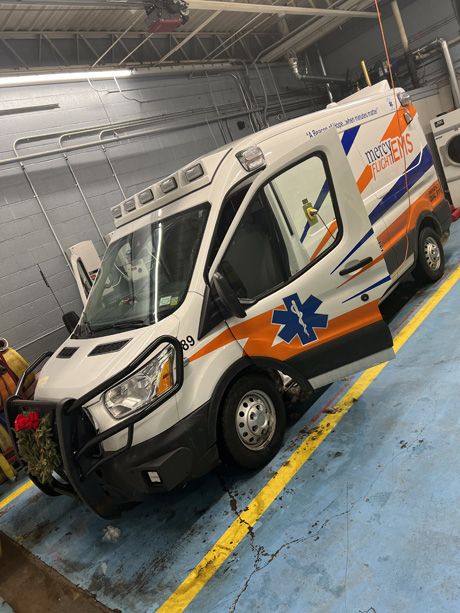
A Mercy EMS ambulance broke down in Oakfield at the start of the storm, stranding its medics, which turned out to be a blessing for the warming shelter at the Fire Hall, with trained medical personnel on hand during the storm event.
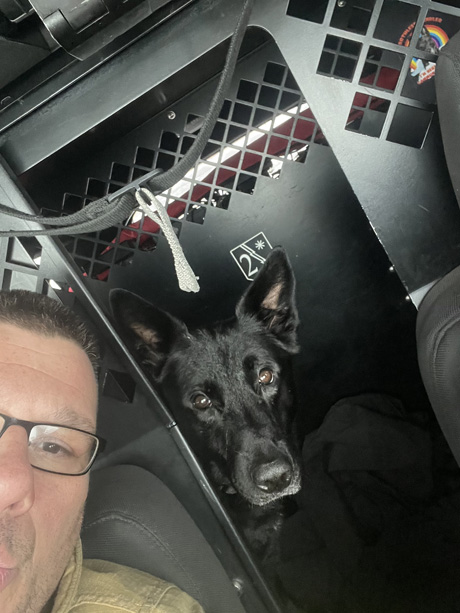
Josh Finn and K-9 Frankie in a search and rescue convoy. Finn and another medic joined the convoys so that if somebody needed medical attention, there was somebody on scene with the training to provide an evaluation.
